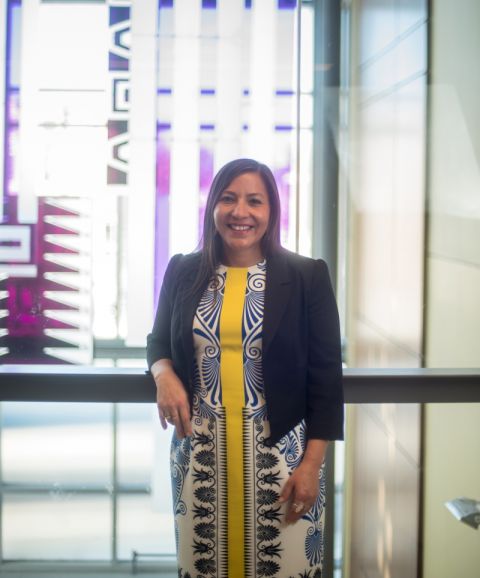
Stacia Loft will play a key role in what promises to be a period of transformative change at Queen’s Law. Tomorrow, the Law’20 graduate returns to campus for her first day as Director of Indigenous Initiatives and Equity, Diversity, and Inclusivity (EDII) Programs, a new position.
“I’m excited to pioneer new pathways to education for Indigenous, racialized, and marginalized people who may not have the opportunity, or who may not see possible, ways to be successful both in and by studying law,” she says.
In her new role, she will champion holistic change management policies, develop long-term initiatives to foster a welcoming and inclusive learning and work environment, and provide both cultural and academic support to equity-seeking students. She also plans to build strategic partnerships for them across campus, the city and beyond: government agencies, NGOs, industry associations, etc.
Dean Mark Walters, calling Loft’s arrival “timely and important,” says, “We are continuing to work towards the ideals of reconciliation and inclusivity to ensure that our school embraces diversity and empowers individuals from culturally, racially, and socioeconomically diverse backgrounds to thrive. We look forward to Stacia’s vision and stewardship of this process to further expand a culture of inclusion through meaningful actions.”
His appointee brings a great deal of experience to the new position: working at the provincial level, working in elected First Nation positions, and working with Indigenous youth (in both Toronto and the Commonwealth of Dominica’s Indigenous Kalinago Territory). “Supporting people, not only within my family, but in my community and broader communities,” she says, “brings a different perspective to the work – not only through an Indigenous lens, but also through a lens of lived experience.”
Loft, from the Tyendinaga Mohawk Territory, was recognized as a community builder, policy advocate, facilitator, and change-maker when she was elected last November as Deputy Grand Chief of the Association of Iroquois and Allied Indians (AIAI). In that role, she supports the provincial and territorial organization’s seven member Nations.
“My role there is one of advocacy and ensuring that our inherent and treaty rights are respected and recognized by the entities that we have to do business with, including federal and provincial governments,” she explains. “The rights for which we advocate range from traditional hunting and fishing to our sovereign ability to monitor ourselves, make our own laws, and use our own jurisdictional approaches.”
Doing all that has made her law degree even more valuable. She can see so clearly the importance of connecting other EDII people with that opportunity. Loft meets with cabinet ministers to raise member Nations’ issues and provides education and knowledge through such forums as the Chiefs of Ontario (for which she holds the justice and women’s initiatives portfolios) and the AIAI (for which she is the education portfolio holder).
Over the past 15 years, even while a law student, Loft was dedicating herself to empowering communities and supporting meaningful pathways to prosperity, most notably as Manager of Justice Programs at the Ontario Federation of Indigenous Friendship Centres, as a Band Councillor of the Mohawks of the Bay of Quinte, and most recently as an articling student with Amnesty International. She was gaining strategic and operational management and governance experience with local, provincial, and federal boards, and advisory tables. She has served, too, as Board Director for Kenhte:ke Midwives, a Clinical Extern at Belleville’s Community Advocacy and Legal Centre, and she continues as a Board Director of the Tyendinaga Native Women’s Association.
To top it all off, Loft was called to the Ontario bar on May 21.
What is she looking forward to in her new directorship? “I’d really like to get a better understanding of what Queen’s University and Queen’s Law have committed to doing and what has been done in terms of the Truth and Reconciliation Task Force recommendations,” she says. “I’d like to read the five-year plan that was put into place, find out whether EDII has achieved what it set out to do, connect with the individuals involved, and take stock of how they feel things have gone.”
Taking time to reflect before moving forward is important to her. “Sometimes we want to see things move quickly, but at the same time we want to ensure that things are done in a good way, that those supposed to be engaged actually are engaged in the process, and to determine whether recommendations made five years ago are still relevant. Perhaps priorities have changed.
“I look to see what needs to be done and how I can make that happen,” she continues. “I want to
create space for Indigenous, racialized, and marginalized individuals to share their experiences. It’s about a collective approach to making sure that an environment exists where people feel welcome and respected and where their experiences and viewpoints are actually utilized, contributing to a much bigger process. As an Indigenous person, I know how important it is that we see ourselves in this work. We need to be voices at the table, and we need to be part of these processes – and we’re going to bring others along the way.”
Clearly, one key word in Loft’s directorship is going to be “we,” not “I.”
Read more about Stacia Loft’s career and her time as a student at Queen’s Law.